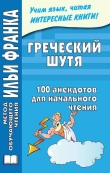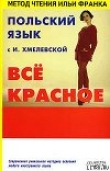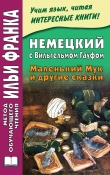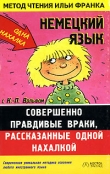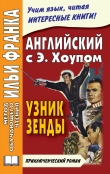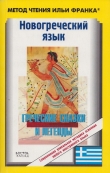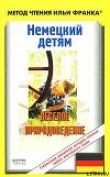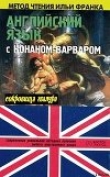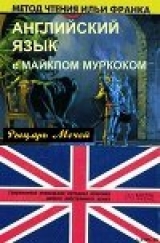
Текст книги "Английский язык с М. Муркоком"
Автор книги: Майкл Джон Муркок
Соавторы: Илья Франк,Андрей Еремин
Жанры:
Языкознание
,сообщить о нарушении
Текущая страница: 26 (всего у книги 36 страниц)
`You are right (ты прав). Well, the Knight lives in a place on top of a mountain that is in the very centre of both this planet and the five planes (итак, Рыцарь живет во дворце на вершине горы, которая находится в самом центре как этой планеты, так и пяти плоскостей). In the topmost tower of that palace he keeps his heart (в самой высокой башне того дворца он хранит свою сердце). It is well-guarded, I understand (оно хорошо охраняется, /как/ я понимаю).
`And is that all you know (это все, что ты знаешь)? You do not know the nature of this protection (ты не знаешь сущности этой охраны = что за охрана)?
`I am employing you, Master Corum, because you have a few more brains (я использую тебя, господин Корум, потому что у тебя немного больше мозгов), a jot more resilience and a fraction more imagination and courage than the Mabden (чуть больше выносливости, воображения и храбрости, чем у мабденов; jot – йота, ничтожное количество; resilience – способность быстро восстанавливать здоровое физическое и душевное состояние; устойчивость к внешним воздействиям; fraction – фрагмент, кусок; частица). It will be up to you to discover what is the nature of his protection (это будет твоей задачей узнать, какая сущность охраны = как охраняется сердце). You may rely upon one thing, however (впрочем, ты можешь полагаться/надеяться на одну вещь).
`What is it, Master Shool (что это = на какую, господин Шул)?
mountain [ˈmauntɪn] guarded [ˈɡɑ:dɪd] resilience [rɪˈzɪlɪəns]
`You still have not described very closely how I may find the Knight of the Swords.
`You are right. Well, the Knight lives in a place on top of a mountain that is in the very centre of both this planet and the five planes. In the topmost tower of that palace he keeps his heart. It is well-guarded, I understand.
`And is that all you know? You do not know the nature of this protection?
`I am employing you, Master Corum, because you have a few more brains, a jot more resilience and a fraction more imagination and courage than the Mabden. It will be up to you to discover what is the nature of his protection. You may rely upon one thing, however.
`What is it, Master Shool?
`Prince Shool. You may rely upon the fact that he will not be expecting any kind of attack from a mortal such as yourself (можешь надеяться на то, что он не будет ожидать какой-либо атаки со стороны смертного, вроде тебя). Like the Vadhagh, Master Corum, the Sword Rulers grow complacent (как и вадаги, господин Корум, Повелители Мечей стали самодовольными). We all climb up (все мы поднимаемся). We all fall down (все падаем). Shool chuckled (Шул хихикнул). `And the planes go on turning, eh (а плоскости продолжают вращаться, а)?
`And when you have climbed up, will you not fall down (а когда ты вскарабкался, не упадешь ли ты)?
`Doubtless – in a few millennia (несомненно – в течение нескольких тысячелетий). Who knows (кто знает)? I could rise so high I could control the whole movement of the multiverse (я мог бы подняться так высоко, /что/ мог бы управлять всем движением мультивселенной = всеми мирами). I could be the first truly omniscient and omnipotent God (я мог бы быть первым действительно всезнающим и всемогущим богом). Oh, what games I could play (о, в какие игры я мог бы играть)!
`We studied little of mysticism among the Vadhagh folk (мы, вадагский народ, мало изучали мистику), Corum put in (перебил Корум), `but I understand all Gods to be omniscient and omnipotent (но, /насколько/ я понимаю, все боги всезнающи и всемогущи).
omniscient [ɔmˈnɪʃ (ə) nt] omnipotent [ɔmˈnɪpət (ə) nt] mysticism [ˈmɪstɪsɪzm]
`Prince Shool. You may rely upon the fact that he will not be expecting any kind of attack from a mortal such as yourself. Like the Vadhagh, Master Corum, the Sword Rulers grow complacent. We all climb up. We all fall down. Shool chuckled. `And the planes go on turning, eh?
`And when you have climbed up, will you not fall down?
`Doubtless – in a few millennia. Who knows? I could rise so high I could control the whole movement of the multiverse. I could be the first truly omniscient and omnipotent God. Oh, what games I could play!
`We studied little of mysticism among the Vadhagh folk, Corum put in, `but I understand all Gods to be omniscient and omnipotent.
`Only on very limited levels (лишь на очень ограниченных уровнях = существуют пределы). Some gods – the Mabden pantheon such as the Dog and the Horned Bear (некоторые боги – /из/ мабденского пантеона, как, например, Пес или Рогатый Медведь) – are more or less omniscient concerning the affairs of Mabden (более или менее всезнающи /в том/, что касается дел мабденов) and they can, if they wish, control those affairs to a large degree (они могут, если пожелают, управлять этими делами в значительной степени). But they know nothing of my affairs and even less of those of the Knight of the Swords (но они ничего не ведают о моих делах, и даже меньше = а уж тем более о /делах/ Рыцаря Мечей), who knows most things, save those that happen upon my well-protected island (который знает о большинстве событий, кроме тех, что происходят на моем хорошо защищенном острове; thing – вещь, предмет; дело, случай). This is an Age of Gods, I am afraid, Master Corum (боюсь, это Эра Богов, господин Корум). There are many, big and small, and they crowd the universe (их много, больших и малых, и они заполонили вселенную; to crowd – толпиться, скапливаться). Once it was not so (когда-то было не так). Sometimes, I suspect, the universe manages with none at all (иногда я думаю, вселенная обходится вообще без них; to suspect – подозревать; полагать, допускать; to manage – управлять; справляться, обходиться)!
`I had thought that (я /тоже/ думал так).
pantheon [ˈpænƟɪən] crowd [kraud]
`Only on very limited levels. Some gods – the Mabden pantheon such as the Dog and the Horned Bear – are more or less omniscient concerning the affairs of Mabden and they can, if they wish, control those affairs to a large degree. But they know nothing of my affairs and even less of those of the Knight of the Swords, who knows most things, save those that happen upon my well-protected island. This is an Age of Gods, I am afraid, Master Corum. There are many, big and small, and they crowd the universe. Once it was not so. Sometimes, I suspect, the universe manages with none at all!
`I had thought that.
`It could come to pass (такое могло бы случиться). It is thought (именно мысль), Shool tapped his skull (Шул постучал себя по черепу; to tap – cтучать, постукивать; хлопать), `that creates Gods and Gods who create thought (создает богов, а боги создают мысль). There must be periods when thought – which I sometimes consider overrated – does not exist (должны быть периоды, когда мысль – которую я иногда считаю переоцененной – не существует). Its existence or lack of it does not concern the universe, after all (ее существование или отсутствие не заботит вселенную/не имеет отношение ко вселенной, в конце концов; lack – недостаток, нужда; отсутствие). But if I had the power – I would make the universe concerned (но если бы у меня было /достаточно/ могущества – я бы заставил вселенную побеспокоиться /об этом/)! Shool's eyes shone (глаза Шула сверкали; to shine). `I would alter its very nature (я изменил бы саму ее природу)! I would change all the conditions (изменил бы все условия)! You are wise to aid me, Master Corum (ты мудр = разумно поступаешь, что помогаешь мне, господин Корум).
period [ˈpɪ (ə) rɪəd] universe [ˈju:nɪvə: s] wise [waɪz]
`It could come to pass. It is thought, Shool tapped his skull, `that creates Gods and Gods who create thought. There must be periods when thought – which I sometimes consider overrated – does not exist. Its existence or lack of it does not concern the universe, after all. But if I had the power – I would make the universe concerned! Shool's eyes shone. `I would alter its very nature! I would change all the conditions! You are wise to aid me, Master Corum.
Corum jerked his head back as something very much like a gigantic mauve tulip, but with teeth, snapped at him (Корум отдернул голову назад, когда что-то очень похожее на громадный розово-лиловый тюльпан, но с зубами, щелкнуло /челюстями/ перед ним; to jerk – резко толкать, дергать/ся/; to snap – хлопать, щелкать; цапать, кусать).
`I doubt it, Shool (сомневаюсь в этом, Шул). But then I have no choice (но ведь у меня нет выбора).
`Indeed, you have not (действительно, нет). Or, at least, your choice is much limited (или, по крайней мере, твой выбор очень ограничен). It is the ambition I hold not to be forced to make choices, on however large a scale, which drives me on, Master Corum (именно цель, которой я придерживаюсь, не быть вынужденным делать выбор, какого бы большого масштаба /он ни был/, движет мной, господин Корум = я всегда стараюсь сам делать свой выбор…; to drive on – продолжать путь; подгонять).
`Aye (да), nodded Corum ironically (кивнул = согласился Корум иронически). `We are all mortal (все мы смертны).
`Speak for yourself, Master Corum (говори за себя, господин Корум)!
gigantic [ʤaɪˈɡæntɪk] mauve [məuv] tulip [ˈtju:lɪp] ironically [aɪˈrɔnɪk (ə) lɪ]
Corum jerked his head back as something very much like a gigantic mauve tulip, but with teeth, snapped at him.
`I doubt it, Shool. But then I have no choice.
`Indeed, you have not. Or, at least, your choice is much limited. It is the ambition I hold not to be forced to make choices, on however large a scale, which drives me on, Master Corum.
`Aye, nodded Corum ironically. `We are all mortal.
`Speak for yourself, Master Corum!
BOOK THREE (часть третья)
In which Prince Corum achieves that which is both impossible and unwelcome (в которой принц Корум добивается того, что невозможно и нежелательно)
CHAPTER ONE (глава первая)
The Walking God (странствующий бог)
to walk – идти, ходить /пешком/; гулять
Corum's leave-taking from Rhalina had not been easy (уход Корума = уйти от Ралины было непросто; leave-taking – уход, прощание). It had been full of tension (он был наполнен напряжением = проходил трудно). There had been no love in her eyes as he had embraced her (в ее глазах не было любви, когда он обнимал ее), only concern for him and fear for both of them (лишь беспокойство о нем и страх за них обоих).
This had disturbed him, but there had been nothing he could do (это тревожило его, но он ничего не мог поделать).
Shool had given him a quaintly shaped boat and he had sailed away (Шул дам ему причудливой формы лодку, и он отчалил; quaint – причудливый, необычный). Now sea stretched in all directions (и вот море простиралось во всех направлениях). With a lodestone to guide him, Corum sailed north for the Thousand League Reef (/используя кусок/ природного магнита для навигации, Корум поплыл на север к Тысячемильному Рифу; to guide – вести, направлять).
Corum knew that he was mad, in Vadhagh terms (Корум понимал, что он безрассуден, с точки зрения вадагов). But he supposed that he was sane enough in Mabden terms (но полагал, что он вполне в здравом уме с точки зрения мабденов). And this was, after all, now a Mabden world (а это был теперь, в конце концов, мир мабденов). He must learn to accept its peculiar disorders as normal, if he were going to survive (он должен научиться принимать его необычные беспорядки как норму, если собирается выжить). And there were many reasons why he wished to survive, Rhalina not least among them (существовало множество причин, почему он желал выжить, /и/ Ралина /занимала/ не последнее /место/ среди них; not least – не в самую последнюю очередь /по важности/). He was the last of the Vadhagh, yet he could not believe it (он был последним из вадагов, однако не мог в это поверить).
embraced [ɪmˈbreɪst] quaintly [ˈkweɪntlɪ] peculiar [pɪˈkju:lɪə]
Corum's leave-taking from Rhalina had not been easy. It had been full of tension. There had been no love in her eyes as he had embraced her, only concern for him and fear for both of them.
This had disturbed him, but there had been nothing he could do.
Shool had given him a quaintly shaped boat and he had sailed away. Now sea stretched in all directions. With a lodestone to guide him, Corum sailed north for the Thousand League Reef.
Corum knew that he was mad, in Vadhagh terms. But he supposed that he was sane enough in Mabden terms. And this was, after all, now a Mabden world. He must learn to accept its peculiar disorders as normal, if he were going to survive. And there were many reasons why he wished to survive, Rhalina not least among them. He was the last of the Vadhagh, yet he could not believe it.
The powers available to sorcerers like Shool might be controlled by others (силы, доступные колдунам вроде Шула, возможно, управляются другими /силами/). The nature of time could be tampered with (/они/ могли бы вмешиваться в /саму/ природу времени; to temper with – вмешиваться в; портить). The circling planes could be halted in their course, perhaps reversed (вращающиеся плоскости могли бы быть остановлены в своем движении, возможно, /даже/ повернуты в противоположном направлении; course – курс, направление; течение). The events of the past year could be changed, perhaps eradicated completely (события последнего года могли бы быть изменены, может быть, совсем стерты; to eradicate – вырвать с корнем, уничтожить). Corum proposed to live and, in living, to learn (Корум решил жить и, живя, учиться; to propose – предлагать; намереваться). And if he learned enough, perhaps he would gain sufficient power to fulfil his ambitions (а если он научится достаточно = многому, возможно, он сможет скопить достаточно сил, чтобы добиться своих целей; to fulfil one`s ambition – добиться своей цели, выполнить замысел) and restore a world to the Vadhagh and the Vadhagh to the world (и вернуть мир вадагам, а вадагов – в этот мир). It would be just, he thought (это было бы справедливо, подумал он).
The boat was of beaten metal on which were many raised and asymmetrical designs (лодка была /сделана/ из кованого металла, на котором располагались многочисленные рельефные асимметричные рисунки; design – чертеж, рисунок, узор). It gave off a faint glow which offered Corum both heat and light during the nights, for the sailing was long (она испускала слабое свечение, которое давало Коруму и тепло, и свет по ночам, так как плавание было длительным; glow – свет, свечение, отблеск; to offer – предлагать; давать). Its single mast bore a single square sail of samite smeared with a strange substance (ее единственная мачта несла единственный квадратный парус из парчи, покрытой странным веществом; to bear; to smear – cмазывать, намазывать) that also shone and turned, without Corum's guidance, to catch any wind (которое тоже светилось и /заставляло парус/ поворачиваться, без управления Корума, чтобы уловить ветер). Corum sat in the boat wrapped in his scarlet robe (Корум сидел в лодке, закутанный в свой алый плащ), his wargear laid beside him (его оружие лежало рядом с ним; gear – принадлежности, снаряжение), his silver helm upon his head (с серебряным шлемом на голове), his double byrnie covering him from throat to knee (двойная кольчуга покрывала его от горла до коленей). From time to time he would hold up his lodestone by its string (время от времени он поднимал за шнурок /кусок/ магнитной руды). The stone was shaped like an arrow and the head pointed always north (камень был в форме стрелы, наконечник которой всегда указывал на север).
asymmetrical [, eɪsɪˈmetrɪk (ə) l] square [skweə] substance [ˈsʌbstəns]
The powers available to sorcerers like Shool might be controlled by others. The nature of time could be tampered with. The circling planes could be halted in their course, perhaps reversed. The events of the past year could be changed, perhaps eradicated completely. Corum proposed to live and, in living, to learn. And if he learned enough, perhaps he would gain sufficient power to fulfil his ambitions and restore a world to the Vadhagh and the Vadhagh to the world. It would be just, he thought.
The boat was of beaten metal on which were many raised and asymmetrical designs. It gave off a faint glow which offered Corum both heat and light during the nights, for the sailing was long. Its single mast bore a single square sail of samite smeared with a strange substance that also shone and turned, without Corum's guidance, to catch any wind. Corum sat in the boat wrapped in his scarlet robe, his wargear laid beside him, his silver helm upon his head, his double byrnie covering him from throat to knee. From time to time he would hold up his lodestone by its string. The stone was shaped like an arrow and the head pointed always north.
He thought much of Rhalina and his love for her (он много думал о Ралине и своей любви к ней). Such a love had never before existed between a Vadhagh and a Mabden (такая любовь никогда раньше не существовала между вадагом и мабденом). His own folk might have considered his feelings for Rhalina degenerate (народ Корума, пожалуй, счел бы его чувства к Ралине извращенными; degenerate – вырождающийся, испорченный), much as a Mabden would suspect such feelings in a man for his mare (подобно тому, как мабден счел бы подозрительными такие чувства в мужчине к его /этого мужчины/ кобыле; much as – почти как), but he was attracted to her more than he had been attracted to any Vadhagh woman and he knew that her intelligence was a match for his (но его влекло к ней сильнее, чем к любой другой вадагской женщине, и он знал, что ее интеллект не уступает его /собственному/; to attract – привлекать, притягивать; match – пара, ровня; равный по силам соперник). It was her moods he found hard to understand – her intimations of doom – her superstition (ему было трудно понять ее настроения – ее проявления обреченности – ее суеверие; mood – настроение, расположение духа; intimation – сообщение, указание; намек; doom – судьба, рок).
Yet Rhalina knew this world better than he (и все же Ралина знала этот мир лучше, чем он). It could be that she was right to entertain such thoughts (могло быть так = возможно, она была права, питая такие мысли = думая подобным образом). His lessons were not yet over (его /же/ уроки еще не закончились).
intelligence [ɪnˈtəlɪʤ (ə) ns] intimation [, ɪntɪˈmeɪʃ (ə) n]
He thought much of Rhalina and his love for her. Such a love had never before existed between a Vadhagh and a Mabden. His own folk might have considered his feelings for Rhalina degenerate, much as a Mabden would suspect such feelings in a man for his mare, but he was attracted to her more than he had been attracted to any Vadhagh woman and he knew that her intelligence was a match for his. It was her moods he found hard to understand – her intimations of doom – her superstition.
Yet Rhalina knew this world better than he. It could be that she was right to entertain such thoughts. His lessons were not yet over.
On the third night, Corum slept, his new hand on the boat's tiller (на третью ночь Корум уснул, /держа/ свою новую руку на румпеле), and in the morning he was awakened by bright sunshine in his eyes (а утром был разбужен ярким солнечным светом, /бившим/ в глаза).
Ahead lay the Thousand League Reef (впереди лежал Тысячемильный Риф).
It stretched from end to end of the horizon and there seemed to be no gap in the sharp fangs of rock that rose from the foaming sea (он протягивался от одного края горизонта до другого, и, казалось, /вообще/ не было пролива в острых клыках скалы = среди похожих на клыки вершин скалы, что поднималась из пенящегося моря; gap – промежуток, брешь, разрыв; проход).
Shool had warned him that few had ever found a passage through the reef and now he could understand why (Шул предупреждал его, что немногие когда-либо находили путь через риф, и теперь он мог понять почему; passage – проход, переправа, путь). The reef was unbroken (риф был непрерывным). It seemed not of natural origin at all (казалось, он вообще не был естественного происхождения), but to have been placed there by some entity as a bastion against intruders (а был помещен сюда каким-то существом в качестве бастиона против незваных гостей; entity – существо, организм; bastion – бастион, укрепление). Perhaps the Knight of the Swords had built it (возможно, Рыцарь Мечей создал его; to build).
horizon [həˈraɪz (ə) n] origin [ˈɔrɪʤɪn] entity [ˈentɪtɪ]
On the third night, Corum slept, his new hand on the boat's tiller, and in the morning he was awakened by bright sunshine in his eyes.
Ahead lay the Thousand League Reef.
It stretched from end to end of the horizon and there seemed to be no gap in the sharp fangs of rock that rose from the foaming sea.
Shool had warned him that few had ever found a passage through the reef and now he could understand why. The reef was unbroken. It seemed not of natural origin at all, but to have been placed there by some entity as a bastion against intruders. Perhaps the Knight of the Swords had built it.
Corum decided to sail in an easterly direction along the reef (Корум решил плыть в восточном направлении вдоль рифа), hoping to find somewhere where he could land the boat (надеясь обнаружить место, где можно причалить к берегу на лодке; somewhere – где-то, где-нибудь) and perhaps drag it overland to the waters that lay beyond the reef (и, по возможности, перетащить ее по земле к воде, что находится за рифом).
He sailed for another four days, without sleep (он плыл еще четыре дня, без сна), and the reef offered neither a passage through nor a place to land (а риф не предлагал = не встречалось ни пролива через /него/, ни места для причаливания).
A light mist, tinged pink by the sun, now covered the water in all directions (легкий туман, чуть окрашенный в розовый цвет солнцем, теперь покрывал воду во всех направлениях) and Corum kept away from the reef by using his lodestone and by listening for the sounds of the surf on the rocks (Корум держался подальше от рифа, используя = ориентируясь по своему магниту и прислушиваясь к звукам прибоя, /рокотавшего/ у скал). He drew out his maps, pricked out on skin, and tried to judge his position (он вытащил свои карты, нарисованные на пергаменте, и попытался определить свое местоположение; to prick – /у/колоть/ся/, просверливать; делать пометки, накалывать /узор/; to judge – судить, оценивать). The maps were crude and probably inaccurate, but they were the best Shool had had (карты были грубыми и, вероятно, неточными, но они были лучшими /картами/, бывшими у Шула). He was nearing a narrow channel between the reef and a land marked on the map as Khoolocrah (он приближался к узкому проливу между рифом и страной, отмеченной на карте как Кулокрах). Shool had been unable to tell him much about the land (Шул не мог рассказать ему много о той земле), save that a race called the Ragha-da-Kheta lived thereabouts (за исключением того, что народ под названием рага-да-кета живет там; thereabouts – поблизости; в окрестности).
tinged [tɪnʤd] inaccurate [ɪnˈækjurɪt] unable [ʌnˈeɪbl]
Corum decided to sail in an easterly direction along the reef, hoping to find somewhere where he could land the boat and perhaps drag it overland to the waters that lay beyond the reef.
He sailed for another four days, without sleep, and the reef offered neither a passage through nor a place to land.
A light mist, tinged pink by the sun, now covered the water in all directions and Corum kept away from the reef by using his lodestone and by listening for the sounds of the surf on the rocks. He drew out his maps, pricked out on skin, and tried to judge his position. The maps were crude and probably inaccurate, but they were the best Shool had had. He was nearing a narrow channel between the reef and a land marked on the map as Khoolocrah. Shool had been unable to tell him much about the land, save that a race called the Ragha-da-Kheta lived thereabouts.
In the light from the boat, he peered at the maps (в свете, /исходившем/ от лодки, он всматривался в карты), hoping to distinguish some gap in the reef marked there, but there was none (надеясь различить какой-либо пролив в рифе, обозначенный там, но на ней не было никакого /пролива/).
Then the boat began to rock rapidly and Corum glanced about him, seeking the source of this sudden eddy (затем лодка начала быстро качаться, и Корум посмотрел вокруг, ища источник этого внезапного волнения; eddy – маленький водоворот, вихрь). Far away, the surf boomed, but then he heard another sound (вдалеке гудел прибой, но потом он услышал другой звук), to the south of him, and he looked there (к югу от себя, и посмотрел туда).
The sound was a regular rushing and slapping noise, like that of a man wading through a stream (звук был /похож/ на постоянный торопливый и шлепающий звук, словно от человека, переходящего вброд ручей; to slap – хлопать, шлепать; noise – шум, гам, грохот; неприятный звук; stream – поток, река, ручей). Was this some beast of the sea (был ли это какой-нибудь зверь моря = морское чудовище)? The Mabden seemed to fear many such monsters (казалось, мабдены боятся многих подобных чудовищ). Corum clung desperately to the sides, trying to keep the boat on course away from the rocks (Корум схватился отчаянно за борта, пытаясь направить лодку на курс прочь от скал = отплыть подальше от скал; to cling – цепляться, крепко держаться), but the waves increased their agitation (но волны усиливали свое волнение = поднимались все больше).
And the sound came closer (а звук /все/ приближался).
distinguish [dɪsˈtɪŋɡwɪʃ] source [sɔ:s] agitation [, æʤɪˈteɪʃ (ə) n]
In the light from the boat, he peered at the maps, hoping to distinguish some gap in the reef marked there, but there was none.
Then the boat began to rock rapidly and Corum glanced about him, seeking the source of this sudden eddy. Far away, the surf boomed, but then he heard another sound, to the south of him, and he looked there.
The sound was a regular rushing and slapping noise, like that of a man wading through a stream. Was this some beast of the sea? The Mabden seemed to fear many such monsters. Corum clung desperately to the sides, trying to keep the boat on course away from the rocks, but the waves increased their agitation.
And the sound came closer.
Corum picked up his long, strong sword and readied himself (Корум поднял свой длинный, крепкий меч и приготовился).
He saw something in the mist then (тут он увидел что-то в тумане). It was a tall, bulky shape – the outline of a man (высокая, грузная фигура – очертания человека). And the man was dragging something behind him (и тот человек тащил что-то за собой). A fishing net (рыболовную сеть)! Were the waters so shallow, then (значит, воды были настолько мелки)? Corum leaned over the side and lowered his sword, point downward, into the sea (Корум перегнулся через борт и опустил меч, острием вниз, в море). It did not touch bottom (он не коснулся дна). He could make out the ocean floor a long way below him (он мог разглядеть дно океана далеко под собой = на большой глубине). He looked back at the figure (он снова посмотрел на фигуру). Now he realised that his eyes and the mist had played tricks on him (теперь Корум осознал, что его глаза и туман обманули его; to play a trick – подшучивать, забавляться; сыграть /с кем-либо/ шутку). The figure was still some distance from him and it was gigantic – far huger than the Giant of Laahr (фигура находилась все еще на некотором расстоянии от него, и она была громадной – намного больше, чем Великан из Лаара; huge – огромный, гигантский). This was what made the waves so large (вот что делало волны такими большими). This was why the boat rocked so (вот почему лодка так раскачивалась).
Corum made to call out, to ask the gigantic creature to move away lest he sink the boat, then he thought better of it (Корум хотел крикнуть, попросить гигантское создание отойти в сторону, чтобы оно не потопило лодку, но потом передумал). Beings like this were considered to think less kindly of mortals than did the Giant of Laahr (считалось, что существа вроде этого думают менее доброжелательно о смертных, чем = не жалуют смертных, в отличие Великана из Лаара; think kindly of me – не поминайте лихом).
downward [ˈdaunwəd] ocean [ˈəuʃ (ə) n] distance [ˈdɪst (ə) ns]
Corum picked up his long, strong sword and readied himself.
He saw something in the mist then. It was a tall, bulky shape – the outline of a man. And the man was dragging something behind him. A fishing net! Were the waters so shallow, then? Corum leaned over the side and lowered his sword, point downward, into the sea. It did not touch bottom. He could make out the ocean floor a long way below him. He looked back at the figure. Now he realised that his eyes and the mist had played tricks on him. The figure was still some distance from him and it was gigantic – far huger than the Giant of Laahr. This was what made the waves so large. This was why the boat rocked so.
Corum made to call out, to ask the gigantic creature to move away lest he sink the boat, then he thought better of it. Beings like this were considered to think less kindly of mortals than did the Giant of Laahr.
Now the giant, still cloaked in mist, changed his course, still fishing (теперь великан, по-прежнему скрытый туманом, изменил направление, продолжая ловить рыбу; to cloak – покрывать плащом; маскировать, прикрывать). He was behind Corum's boat and he trudged on through the water, dragging his nets behind him (он был позади лодки Корума и устало шел по воде, таща свои сети за собой; to trudge – идти с трудом, устало тащиться; с трудом преодолевать что-либо).
The wash sent the boat flying away from the Thousand League Reef, heading almost due east (прибой отнес лодку в сторону от Тысячемильного Рифа, направляя почти прямо на восток; wash – мытье; прибой, волна; to send – посылать, отправлять; направлять /что-либо куда-либо/ с силой; to send flying – сообщать предмету стремительное движение; отбрасывать), and there was nothing Corum could do to stop it (и Корум ничего не мог сделать, чтобы остановить ее). He fought with the sail and the tiller, but they would not respond (он боролся с парусом и румпелем, но они не поддавались; to respond – отвечать, реагировать; срабатывать). It was as if he was borne on a river rushing towards a chasm (словно его несла река, бегущая к глубокому ущелью; to bear; chasm – глубокая трещина, пропасть, ущелье). The giant had set up a current which he could not fight (великан вызвал течение, с которым он не мог бороться; to set up – устанавливать, устраивать; вызывать).
